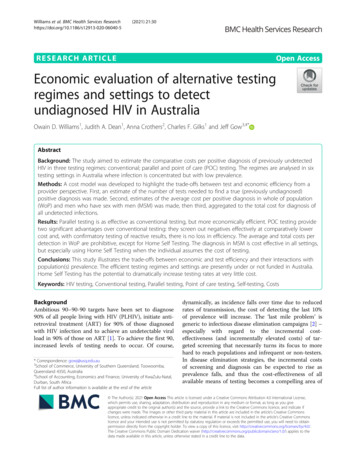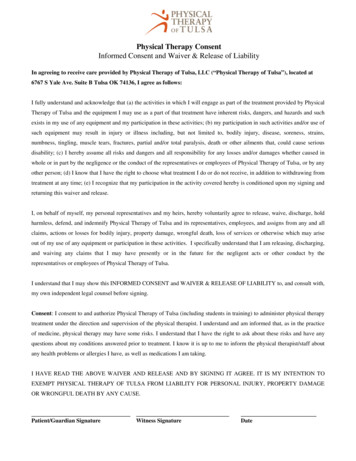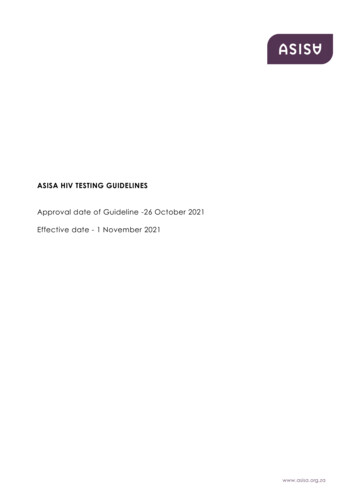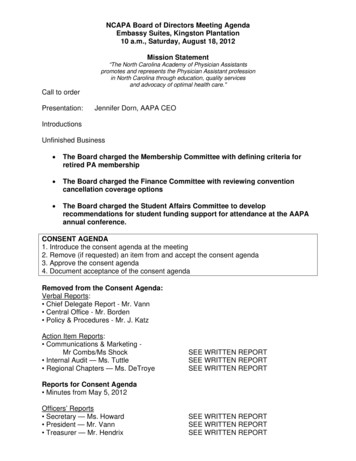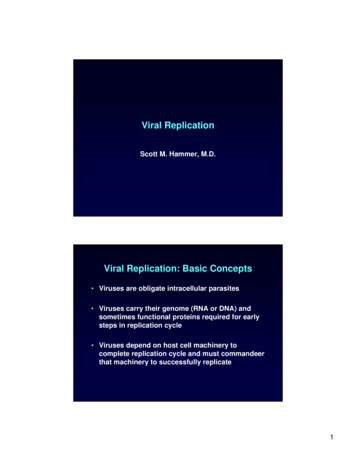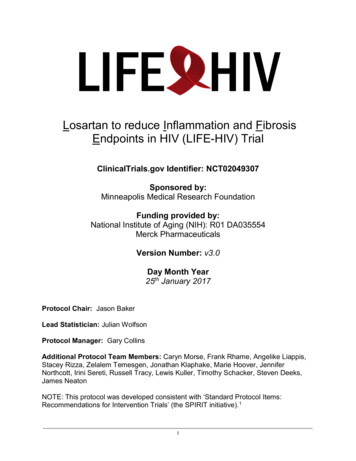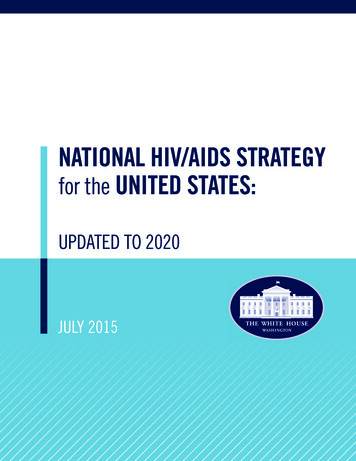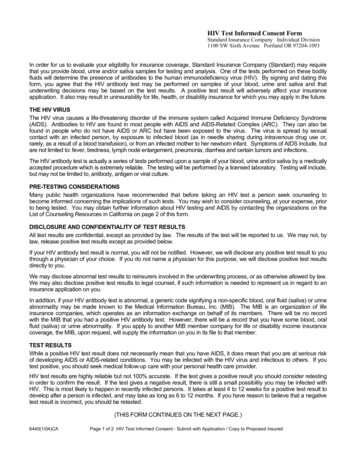
Transcription
HIV Test Informed Consent FormStandard Insurance Company Individual Division1100 SW Sixth Avenue Portland OR 97204-1093In order for us to evaluate your eligibility for insurance coverage, Standard Insurance Company (Standard) may requirethat you provide blood, urine and/or saliva samples for testing and analysis. One of the tests performed on these bodilyfluids will determine the presence of antibodies to the human immunodeficiency virus (HIV). By signing and dating thisform, you agree that the HIV antibody test may be performed on samples of your blood, urine and saliva and thatunderwriting decisions may be based on the test results. A positive test result will adversely affect your insuranceapplication. It also may result in uninsurability for life, health, or disability insurance for which you may apply in the future.THE HIV VIRUSThe HIV virus causes a life-threatening disorder of the immune system called Acquired Immune Deficiency Syndrome(AIDS). Antibodies to HIV are found in most people with AIDS and AIDS-Related Complex (ARC). They can also befound in people who do not have AIDS or ARC but have been exposed to the virus. The virus is spread by sexualcontact with an infected person, by exposure to infected blood (as in needle sharing during intravenous drug use or,rarely, as a result of a blood transfusion), or from an infected mother to her newborn infant. Symptoms of AIDS include, butare not limited to: fever, tiredness, lymph node enlargement, pneumonia, diarrhea and certain tumors and infections.The HIV antibody test is actually a series of tests performed upon a sample of your blood, urine and/or saliva by a medicallyaccepted procedure which is extremely reliable. The testing will be performed by a licensed laboratory. Testing will include,but may not be limited to, antibody, antigen or viral culture.PRE-TESTING CONSIDERATIONSMany public health organizations have recommended that before taking an HIV test a person seek counseling tobecome informed concerning the implications of such tests. You may wish to consider counseling, at your expense, priorto being tested. You may obtain further information about HIV testing and AIDS by contacting the organizations on theList of Counseling Resources in California on page 2 of this form.DISCLOSURE AND CONFIDENTIALITY OF TEST RESULTSAll test results are confidential, except as provided by law. The results of the test will be reported to us. We may not, bylaw, release positive test results except as provided below.If your HIV antibody test result is normal, you will not be notified. However, we will disclose any positive test result to youthrough a physician of your choice. If you do not name a physician for this purpose, we will disclose positive test resultsdirectly to you.We may disclose abnormal test results to reinsurers involved in the underwriting process, or as otherwise allowed by law.We may also disclose positive test results to legal counsel, if such information is needed to represent us in regard to aninsurance application on you.In addition, if your HIV antibody test is abnormal, a generic code signifying a non-specific blood, oral fluid (saliva) or urineabnormality may be made known to the Medical Information Bureau, Inc. (MIB). The MIB is an organization of lifeinsurance companies, which operates as an information exchange on behalf of its members. There will be no recordwith the MIB that you had a positive HIV antibody test. However, there will be a record that you have some blood, oralfluid (saliva) or urine abnormality. If you apply to another MIB member company for life or disability income insurancecoverage, the MIB, upon request, will supply the information on you in its file to that member.TEST RESULTSWhile a positive HIV test result does not necessarily mean that you have AIDS, it does mean that you are at serious riskof developing AIDS or AIDS-related conditions. You may be infected with the HIV virus and infectious to others. If youtest positive, you should seek medical follow-up care with your personal health care provider.HIV test results are highly reliable but not 100% accurate. If the test gives a positive result you should consider retestingin order to confirm the result. If the test gives a negative result, there is still a small possibility you may be infected withHIV. This is most likely to happen in recently infected persons. It takes at least 4 to 12 weeks for a positive test result todevelop after a person is infected, and may take as long as 6 to 12 months. If you have reason to believe that a negativetest result is incorrect, you should be retested.(THIS FORM CONTINUES ON THE NEXT PAGE.)6440(1/04)CAPage 1 of 2 HIV Test Informed Consent - Submit with Application / Copy to Proposed Insured
HIV Test Informed Consent FormStandard Insurance Company Individual Division1100 SW Sixth Avenue Portland OR 97204-1093OTHER SOURCES OF INFORMATIONYou may obtain further information about HIV testing and AIDS by contacting the organizations on the List of CounselingResources in California, below.CONSENT FOR HIV TESTINGI have read and understand this HIV Test Informed Consent Form, and I have received a copy. I voluntarily consent tothe withdrawal of blood, the obtaining of my urine and saliva, and the testing of my blood, urine and saliva for HIVantibodies, and the disclosure of the test results as described in this form. A photocopy of this form is as valid as theoriginal.HIV/AIDS PUBLICATIONI have received a copy of the National Institute of Allergy and Infectious Diseases publication, “HIV Infection and AIDS:An Overview.”NOTIFICATION OF POSITIVE TEST RESULTSI understand that Standard Insurance Company will disclose any HIV positive test result to me through a physician of mychoice, named below. If I do not name a physician for this purpose, Standard will disclose a positive result directly to me.Name of PhysicianStreet AddressCitySignature of Proposed Insured or Parent/GuardianStateZipDate SignedPrint Name of Proposed InsuredLIST OF COUNSELING RESOURCES IN CALIFORNIAThe following counseling centers can assist you in understanding the meaning of the Human Immunodeficiency Virus (HIV)Antibody Test and its results.SAN FRANCISCO AIDS FOUNDATION25 Van Ness Avenue, Suite 660San Francisco, CA 94102(415) 864-5855AIDS SERVICES FOUNDATION OF ORANGE COUNTY1685-A Babcock StreetCosta Mesa, CA 92627(714) 646-0411SACRAMENTO AIDS FOUNDATION1900 K Street, Suite 201Sacramento, CA 95814(916) 448-2437SAN DIEGO AIDS PROJECT3777 Fourth AvenueSan Diego, CA 92103(619) 543-0300CENTRAL VALLEY AIDS TEAMP.O. Box 4640Fresno, CA 93744(209) 264-2436AIDS PROJECT - EAST BAY400 40th Street, Suite 20Oakland, CA 94609(415) 420-8181AIDS PROJECT LOS ANGELES3670 Wilshire Blvd., Suite 300Los Angeles, CA 90010(213) 380-2000ARIS PROJECT595 Millich Drive, Suite 104Campbell, CA 95008(408) 370-31716440(1/04)CAPage 2 of 2 HIV Test Informed Consent - Submit with Application / Copy to Proposed Insured
HIV Test Informed Consent FormStandard Insurance Company Individual Division1100 SW Sixth Avenue Portland OR 97204-1093In order for us to evaluate your eligibility for insurance coverage, Standard Insurance Company (Standard) may requirethat you provide blood, urine and/or saliva samples for testing and analysis. One of the tests performed on these bodilyfluids will determine the presence of antibodies to the human immunodeficiency virus (HIV). By signing and dating thisform, you agree that the HIV antibody test may be performed on samples of your blood, urine and saliva and thatunderwriting decisions may be based on the test results. A positive test result will adversely affect your insuranceapplication. It also may result in uninsurability for life, health, or disability insurance for which you may apply in the future.THE HIV VIRUSThe HIV virus causes a life-threatening disorder of the immune system called Acquired Immune Deficiency Syndrome(AIDS). Antibodies to HIV are found in most people with AIDS and AIDS-Related Complex (ARC). They can also befound in people who do not have AIDS or ARC but have been exposed to the virus. The virus is spread by sexualcontact with an infected person, by exposure to infected blood (as in needle sharing during intravenous drug use or,rarely, as a result of a blood transfusion), or from an infected mother to her newborn infant. Symptoms of AIDS include, butare not limited to: fever, tiredness, lymph node enlargement, pneumonia, diarrhea and certain tumors and infections.The HIV antibody test is actually a series of tests performed upon a sample of your blood, urine and/or saliva by a medicallyaccepted procedure which is extremely reliable. The testing will be performed by a licensed laboratory. Testing will include,but may not be limited to, antibody, antigen or viral culture.PRE-TESTING CONSIDERATIONSMany public health organizations have recommended that before taking an HIV test a person seek counseling tobecome informed concerning the implications of such tests. You may wish to consider counseling, at your expense, priorto being tested. You may obtain further information about HIV testing and AIDS by contacting the organizations on theList of Counseling Resources in California on page 2 of this form.DISCLOSURE AND CONFIDENTIALITY OF TEST RESULTSAll test results are confidential, except as provided by law. The results of the test will be reported to us. We may not, bylaw, release positive test results except as provided below.If your HIV antibody test result is normal, you will not be notified. However, we will disclose any positive test result to youthrough a physician of your choice. If you do not name a physician for this purpose, we will disclose positive test resultsdirectly to you.We may disclose abnormal test results to reinsurers involved in the underwriting process, or as otherwise allowed by law.We may also disclose positive test results to legal counsel, if such information is needed to represent us in regard to aninsurance application on you.In addition, if your HIV antibody test is abnormal, a generic code signifying a non-specific blood, oral fluid (saliva) or urineabnormality may be made known to the Medical Information Bureau, Inc. (MIB). The MIB is an organization of lifeinsurance companies, which operates as an information exchange on behalf of its members. There will be no recordwith the MIB that you had a positive HIV antibody test. However, there will be a record that you have some blood, oralfluid (saliva) or urine abnormality. If you apply to another MIB member company for life or disability income insurancecoverage, the MIB, upon request, will supply the information on you in its file to that member.TEST RESULTSWhile a positive HIV test result does not necessarily mean that you have AIDS, it does mean that you are at serious riskof developing AIDS or AIDS-related conditions. You may be infected with the HIV virus and infectious to others. If youtest positive, you should seek medical follow-up care with your personal health care provider.HIV test results are highly reliable but not 100% accurate. If the test gives a positive result you should consider retestingin order to confirm the result. If the test gives a negative result, there is still a small possibility you may be infected withHIV. This is most likely to happen in recently infected persons. It takes at least 4 to 12 weeks for a positive test result todevelop after a person is infected, and may take as long as 6 to 12 months. If you have reason to believe that a negativetest result is incorrect, you should be retested.(THIS FORM CONTINUES ON THE NEXT PAGE.)6440(1/04)CAPage 1 of 2 HIV Test Informed Consent - Submit with Application / Copy to Proposed Insured
HIV Test Informed Consent FormStandard Insurance Company Individual Division1100 SW Sixth Avenue Portland OR 97204-1093OTHER SOURCES OF INFORMATIONYou may obtain further information about HIV testing and AIDS by contacting the organizations on the List of CounselingResources in California, below.CONSENT FOR HIV TESTINGI have read and understand this HIV Test Informed Consent Form, and I have received a copy. I voluntarily consent tothe withdrawal of blood, the obtaining of my urine and saliva, and the testing of my blood, urine and saliva for HIVantibodies, and the disclosure of the test results as described in this form. A photocopy of this form is as valid as theoriginal.HIV/AIDS PUBLICATIONI have received a copy of the National Institute of Allergy and Infectious Diseases publication, “HIV Infection and AIDS:An Overview.”NOTIFICATION OF POSITIVE TEST RESULTSI understand that Standard Insurance Company will disclose any HIV positive test result to me through a physician of mychoice, named below. If I do not name a physician for this purpose, Standard will disclose a positive result directly to me.Name of PhysicianStreet AddressCitySignature of Proposed Insured or Parent/GuardianStateZipDate SignedPrint Name of Proposed InsuredLIST OF COUNSELING RESOURCES IN CALIFORNIAThe following counseling centers can assist you in understanding the meaning of the Human Immunodeficiency Virus (HIV)Antibody Test and its results.SAN FRANCISCO AIDS FOUNDATION25 Van Ness Avenue, Suite 660San Francisco, CA 94102(415) 864-5855AIDS SERVICES FOUNDATION OF ORANGE COUNTY1685-A Babcock StreetCosta Mesa, CA 92627(714) 646-0411SACRAMENTO AIDS FOUNDATION1900 K Street, Suite 201Sacramento, CA 95814(916) 448-2437SAN DIEGO AIDS PROJECT3777 Fourth AvenueSan Diego, CA 92103(619) 543-0300CENTRAL VALLEY AIDS TEAMP.O. Box 4640Fresno, CA 93744(209) 264-2436AIDS PROJECT - EAST BAY400 40th Street, Suite 20Oakland, CA 94609(415) 420-8181AIDS PROJECT LOS ANGELES3670 Wilshire Blvd., Suite 300Los Angeles, CA 90010(213) 380-2000ARIS PROJECT595 Millich Drive, Suite 104Campbell, CA 95008(408) 370-31716440(1/04)CAPage 2 of 2 HIV Test Informed Consent - Submit with Application / Copy to Proposed Insured
October 2003HIV Infection and AIDS: An OverviewAIDS - acquired immunodeficiency syndrome - was first reported in the United States in1981 and has since become a major worldwide epidemic. AIDS is caused by the humanimmunodeficiency virus (HIV). By killing or damaging cells of the body's immune system,HIV progressively destroys the body's ability to fight infections and certain cancers.People diagnosed with AIDS may get life-threatening diseases called opportunisticinfections, which are caused by microbes such as viruses or bacteria that usually do notmake healthy people sick.More than 830,000 cases of AIDS have been reported in the United States since 1981.As many as 950,000 Americans may be infected with HIV, one-quarter of whom areunaware of their infection. The epidemic is growing most rapidly among minoritypopulations and is a leading killer of African-American males ages 25 to 44. According tothe U.S. Centers for Disease Control and Prevention (CDC), AIDS affects nearly seventimes more African Americans and three times more Hispanics than whites.HOW IS HIV TRANSMITTED?HIV is spread most commonly by having unprotected sex with an infected partner. Thevirus can enter the body through the lining of the vagina, vulva, penis, rectum, or mouthduring sex.HIV also is spread through contact with infected blood. Before donated blood wasscreened for evidence of HIV infection and before heat-treating techniques to destroyHIV in blood products were introduced, HIV was transmitted through transfusions ofcontaminated blood or blood components. Today, because of blood screening and heattreatment, the risk of getting HIV from such transfusions is extremely small.HIV frequently is spread among injection drug users by the sharing of needles orsyringes contaminated with very small quantities of blood from someone infected withthe virus. It is rare, however, for a patient to give HIV to a health care worker or viceversa by accidental sticks with contaminated needles or other medical instruments.11907(10/03)
Women can transmit HIV to their babies during pregnancy or birth. Approximately onequarter to one-third of all untreated pregnant women infected with HIV will pass theinfection to their babies. HIV also can be spread to babies through the breast milk ofmothers infected with the virus. If the mother takes the drug AZT during pregnancy, shecan significantly reduce the chances that her baby will get infected with HIV. If healthcare providers treat mothers with AZT and deliver their babies by cesarean section, thechances of the baby being infected can be reduced to a rate of 1 percent.A study sponsored by the National Institute of Allergy and Infectious Diseases (NIAID) inUganda found a highly effective and safe drug for preventing transmission of HIV froman infected mother to her newborn. This regimen is more affordable and practical thanany other examined to date. Results from the study show that a single oral dose of theantiretroviral drug nevirapine (NVP) given to an HIV-infected woman in labor and anotherto her baby within three days of birth reduces the transmission rate of HIV by halfcompared with a similar short course of AZT.Although researchers have found HIV in the saliva of infected people, there is noevidence that the virus is spread by contact with saliva. Laboratory studies reveal thatsaliva has natural properties that limit the power of HIV to infect. Research studies ofpeople infected with HIV have found no evidence that the virus is spread to othersthrough saliva by kissing. No one knows, however, whether so-called "deep" kissing,involving the exchange of large amounts of saliva, or oral intercourse increase the risk ofinfection. Scientists also have found no evidence that HIV is spread through sweat,tears, urine, or feces.Studies of families of HIV-infected people have shown clearly that HIV is not spreadthrough casual contact such as the sharing of food utensils, towels and bedding,swimming pools, telephones, or toilet seats. HIV is not spread by biting insects such asmosquitoes or bedbugs.HIV can infect anyone who practices risky behaviors such as Sharing drug needles or syringesHaving sexual contact with an infected person without using a condomHaving sexual contact with someone whose HIV status is unknownHaving a sexually transmitted disease such as syphilis, genital herpes, chlamydialinfection, gonorrhea, or bacterial vaginosis appears to make people more susceptible togetting HIV infection during sex with infected partners.2
SYMPTOMS OF HIV INFECTIONMany people do not have any symptoms when they first become infected with HIV.Some people, however, have a flu-like illness within a month or two after exposure to thevirus. This illness may include FeverHeadacheTirednessEnlarged lymph nodes (glands of the immune system easily felt in the neck andgroinThese symptoms usually disappear within a week to a month and are often mistaken forthose of another viral infection. During this period, people are very infectious, and HIV ispresent in large quantities in genital fluids.More persistent or severe symptoms may not appear for 10 years or more after HIV firstenters the body in adults, or within two years in children born with HIV infection. Thisperiod of "asymptomatic" infection is highly individual. Some people may begin to havesymptoms within a few months, while others may be symptom-free for more than 10years.Even during the asymptomatic period, the virus is actively multiplying, infecting, andkilling cells of the immune system. The most obvious effect of HIV infection is a declinein the number of CD4 positive T cells (also called T4 cells) found in the blood -- theimmune system's key infection fighters. At the beginning of its life in the human body, thevirus disables or destroys these cells without causing symptoms.As the immune system worsens, a variety of complications start to take over. For manypeople, the first signs of infection are large lymph nodes or "swollen glands" that may beenlarged for more than three months. Other symptoms often experienced months toyears before the onset of AIDS include Lack of energyWeight lossFrequent fevers and sweatsPersistent or frequent yeast infections (oral or vaginal)Persistent skin rashes or flaky skinPelvic inflammatory disease in women that does not respond to treatmentShort-term memory lossSome people develop frequent and severe herpes infections that cause mouth, genital,or anal sores, or a painful nerve disease called shingles. Children may grow slowly or besick a lot.3
AIDSThe term AIDS applies to the most advanced stages of HIV infection. CDC developedofficial criteria for the definition of AIDS and is responsible for tracking the spread ofAIDS in the United States.CDC's definition of AIDS includes all HIV-infected people who have fewer than 200 CD4positive T cells (abbreviated CD4 T cells) per cubic millimeter of blood (Healthy adultsusually have CD4 positive T-cell counts of 1,000 or more.). In addition, the definitionincludes 26 clinical conditions that affect people with advanced HIV disease. Most ofthese conditions are opportunistic infections that generally do not affect healthy people.In people with AIDS, these infections are often severe and sometimes fatal because theimmune system is so ravaged by HIV that the body cannot fight off certain bacteria,viruses, fungi, parasites, and other microbes.Symptoms of opportunistic infections common in people with AIDS include Coughing and shortness of breathSeizures and lack of coordinationDifficult or painful swallowingMental symptoms such as confusion and forgetfulnessSevere and persistent diarrheaFeverVision lossNausea, abdominal cramps, and vomitingWeight loss and extreme fatigueSevere headachesComaChildren with AIDS may get the same opportunistic infections as do adults with thedisease. In addition, they also have severe forms of the bacterial infections all childrenmay get, such as conjunctivitis (pink eye), ear infections, and tonsillitis.People with AIDS are particularly prone to developing various cancers, especially thosecaused by viruses such as Kaposi's sarcoma and cervical cancer, or cancers of theimmune system known as lymphomas. These cancers are usually more aggressive anddifficult to treat in people with AIDS. Signs of Kaposi's sarcoma in light-skinned peopleare round brown, reddish, or purple spots that develop in the skin or in the mouth. Indark-skinned people, the spots are more pigmented.During the course of HIV infection, most people experience a gradual decline in thenumber of CD4 positive T cells; although some may have abrupt and dramatic drops intheir CD4 positive T-cell counts. A person with CD4 positive T cells above 200 mayexperience some of the early symptoms of HIV disease. Others may have no symptomseven though their CD4 positive T-cell count is below 200.4
Many people are so debilitated by the symptoms of AIDS that they cannot hold steadyemployment or do household chores. Other people with AIDS may experience phases ofintense life-threatening illness followed by phases in which they function normally.A small number of people first infected with HIV 10 or more years ago have notdeveloped symptoms of AIDS. Scientists are trying to determine what factors mayaccount for their lack of progression to AIDS, such as particular characteristics of theirimmune systems or whether they were infected with a less aggressive strain of the virus,or if their genes may protect them from the effects of HIV. Scientists hope thatunderstanding the body's natural method of control may lead to ideas for protective HIVvaccines and use of vaccines to prevent the disease from progressing.DIAGNOSISBecause early HIV infection often causes no symptoms, a doctor or other health careprovider usually can diagnose it by testing a person's blood for the presence ofantibodies (disease-fighting proteins) to HIV. HIV antibodies generally do not reachdetectable levels in the blood for one to three months following infection. It may take theantibodies as long as six months to be produced in quantities large enough to show up instandard blood tests.People exposed to the virus should get an HIV test as soon as they are likely to developantibodies to the virus - within 6 weeks to 12 months after possible exposure to the virus.By getting tested early, people with HIV infection can discuss with a health care providerwhen they should start treatment to help their immune systems combat HIV and helpprevent the emergence of certain opportunistic infections (see section on treatmentbelow). Early testing also alerts HIV-infected people to avoid high-risk behaviors thatcould spread the virus to others.Most health care providers can do HIV testing and will usually offer counseling to thepatient at the same time. Of course, individuals can be tested anonymously at manysites if they are concerned about confidentiality.Health care providers diagnose HIV infection by using two different types of antibodytests, ELISA and Western Blot. If a person is highly likely to be infected with HIV and yetboth tests are negative, the health care provider may request additional tests. Theperson also may be told to repeat antibody testing at a later date, when antibodies to HIVare more likely to have developed.Babies born to mothers infected with HIV may or may not be infected with the virus, butall carry their mothers' antibodies to HIV for several months. If these babies lacksymptoms, a doctor cannot make a definitive diagnosis of HIV infection using standardantibody tests until after 15 months of age. By then, babies are unlikely to still carry theirmothers' antibodies and will have produced their own, if they are infected. Health careexperts are using new technologies to detect HIV itself to more accurately determine HIVinfection in infants between ages 3 months and 15 months. They are evaluating a5
number of blood tests to determine if they can diagnose HIV infection in babies youngerthan 3 months.TREATMENTWhen AIDS first surfaced in the United States, there were no medicines to combat theunderlying immune deficiency and few treatments existed for the opportunistic diseasesthat resulted. During the past 10 years, however, researchers have developed drugs tofight both HIV infection and its associated infections and cancers.The U.S. Food and Drug Administration (FDA) has approved a number of drugs fortreating HIV infection. The first group of drugs used to treat HIV infection, callednucleoside reverse transcriptase (RT) inhibitors, interrupts an early stage of the virusmaking copies of itself. Included in this class of drugs (called nucleoside analogs) areAZT, ddC (zalcitabine), ddI (dideoxyinosine), d4T (stavudine), 3TC (lamivudine),abacavir (ziagen), and tenofovir (viread). These drugs may slow the spread of HIV in thebody and delay the start of opportunistic infections.Health care providers can prescribe non-nucleoside reverse transcriptase inhibitors(NNRTIs), such as delvaridine (Rescriptor), nevirapine (Viramune), and efravirenz(Sustiva), in combination with other antiretroviral drugs.FDA also has approved a second class of drugs for treating HIV infection. These drugs,called protease inhibitors, interrupt virus replication at a later step in its life cycle. Theyinclude Ritonavir (Norvir)Saquinivir (Invirase)Indinavir (Crixivan)Amprenivir (Agenerase)Nelfinavir (Viracept)Lopinavir (Kaletra)Because HIV can become resistant to any of these drugs, health care providers mustuse a combination treatment to effectively suppress the virus. When RT inhibitors andprotease inhibitors are used in combination, it is referred to as highly active antiretroviraltherapy, or HAART, and can be used by people who are newly infected with HIV as wellas people with AIDS.Researchers have credited HAART as being a major factor in significantly reducing thenumber of deaths from AIDS in this country. While HAART is not a cure for AIDS, it hasgreatly improved the health of many people with AIDS and it reduces the amount of viruscirculating in the blood to nearly undetectable levels. Researchers, however, have shownthat HIV remains present in hiding places, such as the lymph nodes, brain, testes, andretina of the eye, even in patients who have been treated.6
Despite the beneficial effects of HAART, there are side effects associated with the use ofantiviral drugs that can be severe. Some of the nucleoside RT inhibitors may cause adecrease of red or white blood cells, especially when taken in the later stages of thedisease. Some may also cause inflammation of the pancreas and painful nerve damage.There have been reports of complications and other severe reactions, including death, tosome of the antiretroviral nucleoside analogs when used alone or in combination.Therefore, health care experts recommend that people on antiretroviral therapy beroutinely seen and followed by their health care providers. The most common sideeffects associated with protease inhibitors include nausea, diarrhea, and othergastrointestinal symptoms. In addition, protease inhibitors can interact with other drugsresulting in serious side effects.A number of drugs are available to help treat opportunistic infections to which peoplewith HIV are especially prone. These drugs include Foscarnet and ganciclovir to treat cytomegalovirus (CMV)eye infectionsFluconazole to treat yeast and other fungal infectionsTrimethoprim/sulfamethoxazole (TMP/SMX) or pentamidine to treat Pneumocystiscarinii pneumonia (PCP)In addition to antiretroviral therapy, health care providers treat adults with HIV, whoseCD4 T-cell counts drop below 200, to prevent the occurrence of PCP, which is one ofthe most common and deadly opportunistic infections associated with HIV. They givechildren PCP preventive therapy when their CD4 T-cell counts drop to levelsconsidered below normal for their age group. Regardless of their CD4 T-cell counts,HIV-infected children and adults who have survived an episode of PCP take drugs f
application. It also may result in uninsurability for life, health, or disability insurance for which you may apply in the fut ure. THE HIV VIRUS The HIV virus causes a life-threatening disorder of the immune system called Acquired Immune Deficiency Syndrome (AIDS). Antibodies to HIV are found in most people with AIDS and AIDS-Related Complex .
